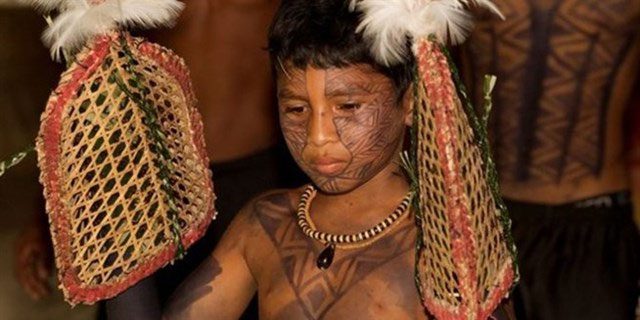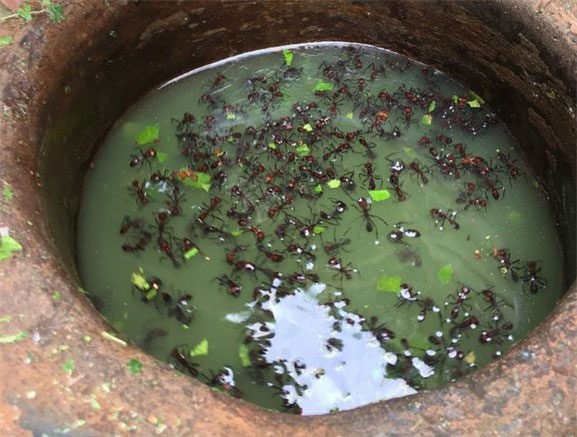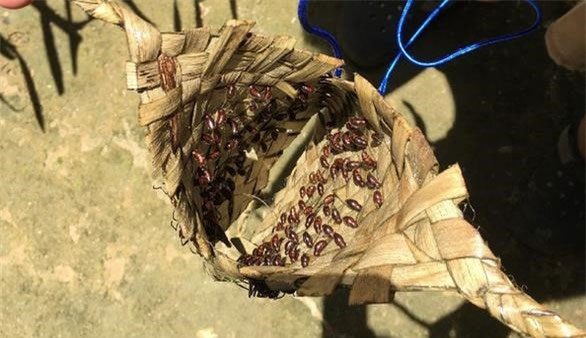In the Satere Mawe tribe of Brazil, when boys turn 12, they must allow themselves to be stung by the Paraponera clavata ants on both hands without shedding a tear. This rite of passage is essential for boys to be recognized as men in their community.
The Satere Mawe Tribe is located in the Amazon rainforest region of Brazil, with a population of over 10,000 people. Here, a young man is not considered an adult until he undergoes the ritual of wearing gloves filled with Paraponera clavata ants.
This unusual tradition is called Tucandeira. Refusing to participate in the Tucandeira is seen as a source of shame for both the individual and their family.

A boy wearing gloves to be stung by ants according to the Satere Mawe tribe’s tradition.
The Paraponera clavata ant (bullet ant) is named for the intense pain akin to being shot that it inflicts when bitten. This species measures about 2.5 cm long and lives in trees and foliage, feeding on small insects and nectar.
These ants are found in forests stretching from Nicaragua to Paraguay. Their survival instincts compel them to bite and inject venom when disturbed. The venom disrupts nerve signal transmission, resulting in paralysis and excruciating pain.

Ants are “knocked out” by soaking them in a special herbal solution.
According to the Satere Mawe’s coming-of-age tradition, when boys turn 12, they venture into the forest with other young men from the tribe to search for bullet ants. They catch the largest, strongest ants from their nests and soak them in a special herbal solution until they become unconscious.
The villagers of Satere Mawe then gift the participating boys a pair of gloves woven from leaves.
The unconscious bullet ants are packed into the gloves with their stingers facing inward, preventing them from escaping. As the ants gradually regain consciousness, they become aggressive and ready to attack anything in their path.
Before the Tucandeira ceremony begins, the boy’s hands are painted black, and a simple black ant is drawn on his back, along with lines running down his chest, arms, and face as a way to boost morale and alleviate pain.

Inside the gloves filled with bullet ants for the Tucandeira coming-of-age ceremony.
Then, the boy places both hands into the glove filled with ants to officially begin the ceremony. He is held by several adults while they sing and dance. The men then switch to drumming, continuing for 10 to 20 minutes.
During this time, the ants gradually wake up and attempt to escape the gloves. They become agitated and will bite anything obstructing their path. The boy is stung not just once but by dozens of bullet ants during this period, forcing him to raise his hands above his head.
According to the Schmidt Pain Index, the bullet ant has the most painful sting in the world. Justin O. Schmidt, an entomologist in the U.S., described it as “the sting of a bullet ant feels like walking on hot coals with a 5 cm nail embedded in your foot.”
Meanwhile, the bullet ants attack every part of the boy’s hands, but no matter how painful it gets, the boys must remain calm, showing no signs of pain or fear. If they shed a tear, they must repeat the ritual until they no longer cry.

Each boy wishing to be recognized as a man must endure this ritual up to 20 times.
However, the pain from the stings is nothing compared to the agony of removing the gloves. This is when the real torture begins. The venom from the bullet ants spreads throughout the boy’s bloodstream, prolonging the pain and inducing hallucinations for the next 24 hours. The excruciating pain can feel like it penetrates to the bone, leaving the boy feeling numb in his hands.
After completing the ritual, most boys experience hallucinations, swollen and paralyzed hands. This horrific pain is not the worst part, as they also face a high risk of death from the large amount of toxins their bodies have absorbed.
Yet, despite the intense pain, this is not a one-time ordeal. Each boy wishing to be recognized as an adult man, capable of marrying and participating in significant tribal events, must undergo this ritual up to 20 times, spanning several months or even years. The tribe believes that the venom of the bullet ant can increase resistance against yellow fever, malaria, and other mosquito-borne diseases.
Although the Tucandeira coming-of-age ceremony of the Satere Mawe tribe may seem terrifying, for the residents here, this ritual proves the physical and mental strength of a mature man. From this point, they can become independent and start their own families.
If they are unable to successfully complete the ritual, these boys will remain at home with their mothers and have limited interaction with the tribe. Naturally, most will find it hard to attract a partner.




















































